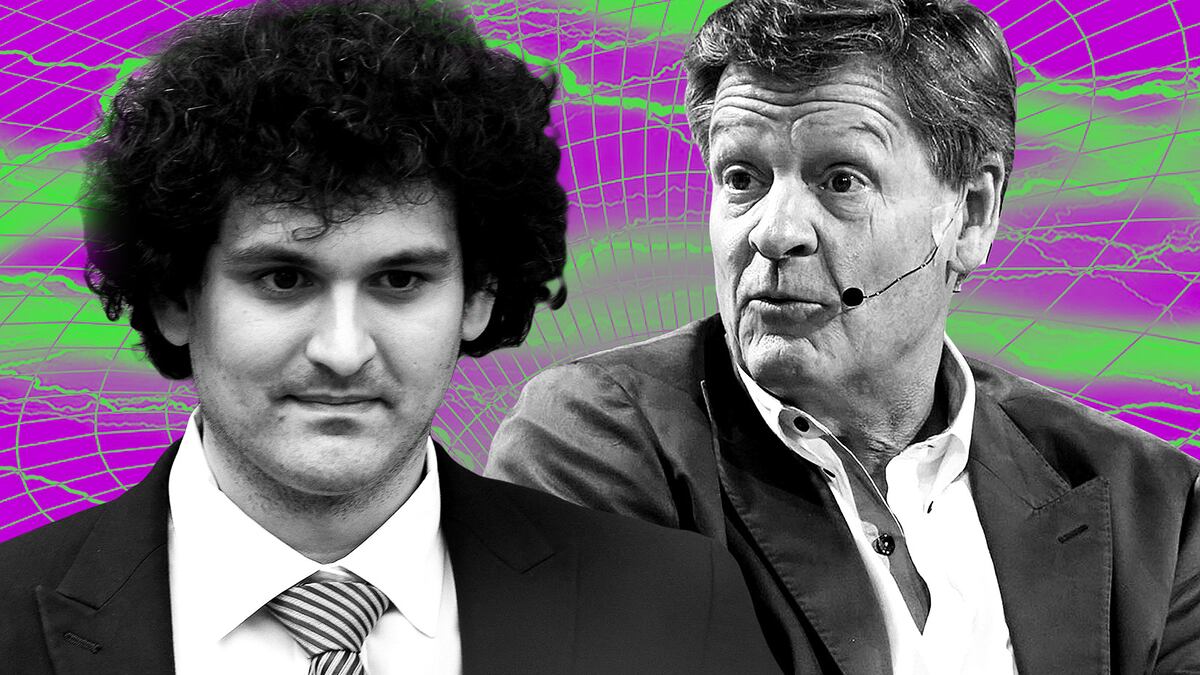- Michael Lewis says vitriol towards Sam Bankman-Fried helped fuel his best-ever book launch.
- He says he's experienced similar backlash before, and explains how it has helped sales.
- Lewis reveals more details about Bankman-Fried during promotional events in London.
In crypto circles, the reaction to Michael Lewis’ new book — chronicling the rise and fall of cryptocurrency founder Sam Bankman-Fried — was brutal.
“Going Infinite: The Rise and Fall of a New Tycoon,” debuted on the eve of Bankman-Fried’s trial, where he pleaded not guilty to charges of fraud and conspiracy.
The book now tops the non-fiction best-seller list of The New York Times, even as the paper’s own critic wrote that Lewis, who spent months with the maths whiz and former billionaire, is “stubbornly credulous” of Bankman-Fried and his industry.
Lewis confronted, even welcomed, the criticism.
“Am I used to being hated? Not really,” he said while promoting the book at the Financial Times Due Diligence Forum in London earlier this month. “The odd fact … it sells the hell out of the book. I sold, in the first week, 100,000 copies of this book. I’ve never done it before.”
Crypto folks — and many in traditional finance as well — ranted furiously on Twitter, now X, after a clip circulated of Lewis on CBS’ “60 Minutes” where he said FTX would have been fine if it weren’t for the run on the exchange in November. (The implication: it was jittery customers, and not illegal funnelling of customer funds, that was the real issue in the whole debacle.)
‘Am I used to being hated? Not really’
— Michael Lewis
Some readers chafed at Lewis’ empathetic description of Bankman-Fried as somewhat of a hapless nerd. This was especially jarring when juxtaposed against former FTX employees’ testimonies during his criminal trial this month.
Former colleagues painted the crypto founder as calculating, and suggested his couldn’t-care-less slob image was manufactured for the media.
Lewis gives voice to those one-time associates, including Tara Mac Auley, the co-founder of his Alameda Research crypto hedge fund, who called him “manipulative.”
Bahamas financial regulator Christina Rolle told Lewis, “It’s not hard to see you are being played by him, like a board game.”
But these comments aren’t thoroughly explored in the book.
Lewis has defended “Going Infinite” and explained on his London book tour that he simply found a great character: a billionaire who dresses like a schlub; who plays video games during televised interviews; who passes out on bean bags in the office.
It’s not a piece of investigative journalism; Lewis is a storyteller.
“From a writer’s point of view, it’s just delightful,” he said at a separate book launch event in London earlier this month.
And “Going Infinite” is a thrilling read. Lewis deftly paints Bankman-Fried and those around him with nuance and complexity.
He said he deliberately avoided the term “autism” because he didn’t want readers to box in his subject with labels.
More importantly, Lewis is able with skillful flourish to show us the world that allows a person like Bankman-Fried to rise and thrive within it.
And any backlash probably won’t have any long-term effects, Lewis said. “It’ll probably have its life in the world. So I don’t worry that much about it.”
‘Twice when books came out, I faced a vicious and hostile reaction’
— Michael Lewis
And yet, he also dismissed “Going Infinite” critics as mere Twitter trolls.
“If this book were published 15 years ago, you wouldn’t have seen this reaction — it’s the existence of Twitter,” he said at the FT forum in London. “It’s the ability of people who are upset or threatened or whatever to get organised to create a noise.”
Lewis says he’s faced such backlash before.
“Twice when books came out, I faced a vicious and hostile reaction,” he said. The first was “Moneyball,” a 2003 account of the Oakland Athletics baseball team, led at the time by general manager Billy Beane.
Beane upended the conventional wisdom surrounding professional baseball recruiting, crunching data to find the best players instead of relying on the subjective skills of talent scouts.
“It was war when that came out,” he said. “Anybody who was classified as an expert in professional sports came after me — to the point where for about a year I couldn’t turn on a sporting event on American television without running the risk of having someone say something nasty about me and the book.”
”And the other one was Flash Boys,” he said.
The 2014 book chronicles trader Brad Katsuyama and his battle against what he saw as a rigged stock market that favours giant speed-trading platforms.
Lewis suggested criticism of “Flash Boys” was financially motivated.
“That one was really curious,” Lewis said, “because it was essentially an organised and financed campaign by a few high-frequency trading firms. They created a lobby to actually lobby against the book.”
The three books Lewis mentions are about, essentially, arbitrage — that is, finding areas where assets are undervalued, or mispriced, and leveraging that knowledge to beat the established players.
Lewis, who made his name in the finance world with the 1989 best-seller “Liar’s Poker,” often frames his protagonists as little guys navigating their way against more powerful institutions.
In the autobiographical “Liar’s Poker,” Lewis includes himself as one of them.
Bankman-Fried has probably read “Going Infinite” — Lewis said earlier this month that he was “smuggled” a copy to peruse in his jail cell.
Lewis says his stance on Bankman-Fried is unique, built over months of shadowing him, and he dismissed the idea he was soft on his subject.
Rebutting the crypto haters, he struck a defiant note: “I’ve earned it.”
If he were active on Twitter, Lewis would fit right in.
Do you have a tip on FTX or another story? Reach out to me at trista@dlnews.com.
